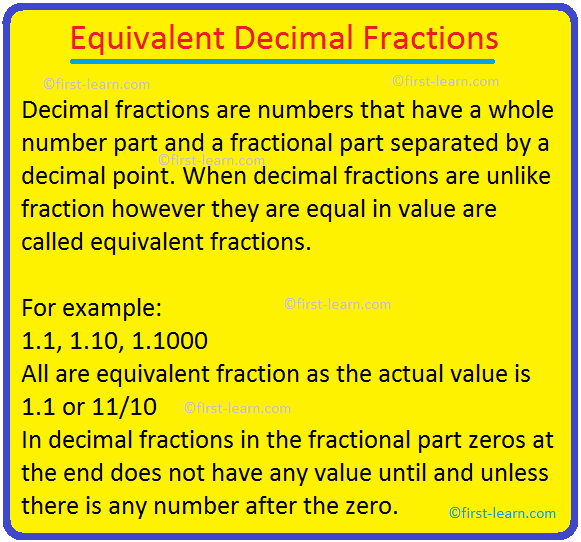Equivalent Decimal Fractions
Decimal fractions are numbers that have a whole number part and a fractional part separated by a decimal point. When decimal fractions are unlike fraction however they are equal in value are called equivalent fractions.
For example:
1.1, 1.10, 1.1000
All are equivalent fraction as the actual value is 1.1 or 11/10
In decimal fractions in the fractional part zeros at the end does not have any value until and unless there is any number after the zero.
Here are few examples and state whether they are equivalent fractions or not. State the reasons for your answer.
(i) 4.001, 45, 45.01, 45.10
These are not equivalent decimal fractions as:
4.001 = 4001/1000
45
45.01 = 4501/100
45.10 = 4510/100
Here we can see that all the fractions have different values hence they cannot be termed as equivalent fractions.
(ii) 23.23, 23.230, 23.2300
These are equivalent decimal fractions as:
23.23 = 2323/100
23.230 = 23230/1000
23.2300 = 232300/10000
The value of all the fractions are 2323/100 hence these decimal numbers are equivalent fractions
(iii) 45.40, 45.400, 45.4000
These are equivalent decimal fractions as:
45.40 = 4540/100
45.400 = 45400/1000
45.4000 = 454000/10000
The value of all the fractions are 4540/100 hence these decimal numbers are equivalent fractions
(iv) 54, 54.20, 54.23, 5474
These are not equivalent decimal fractions as:
54
54.20 = 5420100
54.23 = 5423/100
5474
Here we can see that all the fractions have different values hence they cannot be termed as equivalent fractions.
(v) 2.01, 2.0101, 2.0100, 2.015
These are not equivalent decimal fractions as:
2.01 = 201/100
2.0101 = 20101/10000
2.0100 = 20100/10000
2.015 = 2015/1000
Here we can see that all the fractions have different values hence they cannot be termed as equivalent fractions.
(vi) 5.23, 5.230, 5.230000, 5.23000
These are equivalent decimal fractions as:
5.23 = 523/100
5.230 = 5.230/1000
5.230000 = 5230000/1000000
5.23000= 523000/100000
The value of all the fractions is 523/100 hence these decimal numbers are equivalent fractions
(vii) 52.00, 52.002, 52.03, 52.01, 52.06, 52.68
These are not equivalent decimal fractions as:
52.00 = 52/100
52.002 = 52002/1000
52.03 = 5203/100
52.01 = 5201/100
52.06 = 5206/100
52.68 = 5268/100
Here we can see that all the fractions have different values hence they cannot be termed as equivalent fractions.
(viii) 95.56, 95.560, 95.5600, 95.56000
These are equivalent decimal fractions as:
95.56 = 9556/100
95.560 = 95560/1000
95.5600 = 955600/10000
95.56000 = 9556000/10000
The value of all the fractions is 9556/100 hence these decimal numbers are equivalent fractions
(ix) 45.632, 45.321, 45.001, 45.007, 452.01
These are not equivalent decimal fractions as:
45.632 = 45632/1000
45.321 = 45321/1000
45.001 = 45001/1000
45.007 = 45007/1000
452.01 = 45201/100
Here we can see that all the fractions have different values hence they cannot be termed as equivalent fractions.
(x) 69.23, 69.230, 69.2300, 69.230000
These are equivalent decimal fractions as:
69.23 = 6923/100
69.230 = 69230/1000
69.2300 = 692300/10000
69.230000 = 69230000/1000000
The value of all the fractions is 6923/100 hence these decimal numbers are equivalent fractions.
From Equivalent Decimal Fractions to HOME PAGE
Recent Articles
-
What Is Plasma? | Blood Plasma | Proteins | Nutrients | Cholesterol
Nov 07, 25 10:29 AM
Blood is a mobile fluid which is a connective tissue and is derived from the mesoderm like cell any other connective tissue. Colour of blood is reddish and that flows inside the blood vessels by means… -
Disorders of Respiratory System | Tuberculosis | Pleurisy | Emphysema
Oct 28, 25 11:39 PM
Tuberculosis is very common disease and is caused by a type of bacteria called Mycobacterium tuberculosis. This disease causes different trouble in the respiration and infection of several parts of th… -
Regulation of Respiration | Respiratory Centres | Inspiratory Area |
Oct 14, 25 12:13 AM
Respiratory Centre is the area that controls the rate of respiration and it is observed to be located in medulla oblongata and pons. Respiratory Centre has the following will dispersed components like… -
Explain Transport of Gases | External Respiration | Tissue Respiration
Oct 09, 25 11:35 PM
In humans gaseous exchange is completed in the following ways the steps are - External Respiration or Breathing - Breathing in false taking in of Oxygen and giving out of carbon dioxide in the body. M… -
Kind and Number of Teeth | Location of Teeth in Mouth | Care of Teeth
Sep 11, 25 12:52 AM
Kind and Number of Teeth







New! Comments
Have your say about what you just read! Leave me a comment in the box below.